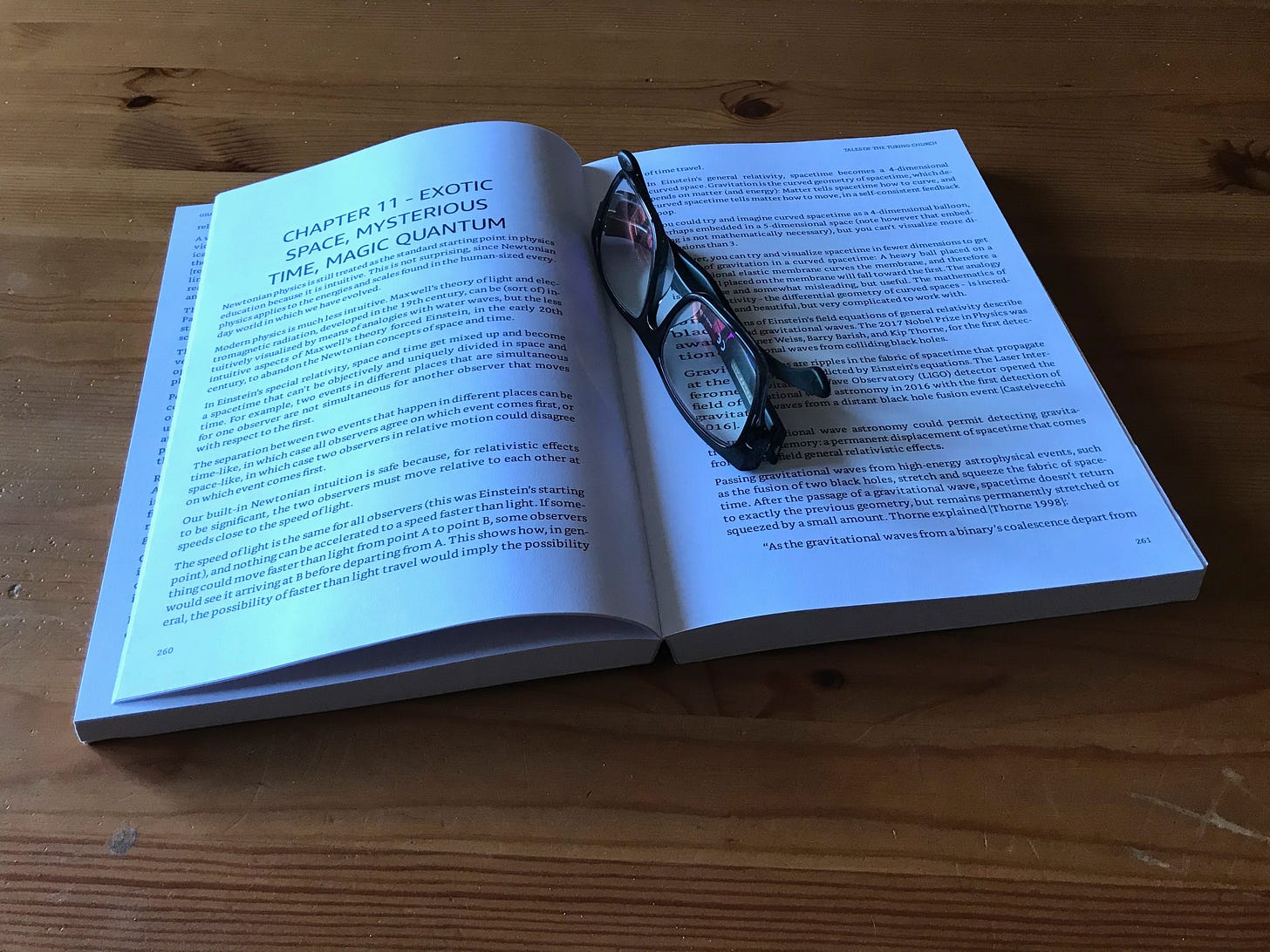Greetings to all readers and subscribers, and special greetings to the paid subscribers!
Please scroll down for the main topic of this newsletter. But first:
A great man passed on two weeks ago: Edward Wilson. I have been reading again Wilson’s meta-science masterwork “Consilience: The Unity of Knowledge” and reading for the first time Wilson’s autobiography “Naturalist.” I don’t agree with everything that Wilson says - in particular I don’t agree with his staunch reductionism - but I think he was a great scientist and a great man.
Therefore I find it outrageous that a once great journal, Scientific American, smeared Wilson’s memory with an unbelievably stupid piece (I won’t link to it) full of sanctimonious fact-free ideology.
Listen to Richard Dawkins, Scott Aaronson, and Michael Shermer. Clear thinkers kike them are waking up and speaking up. I tend to ignore nonsense of this sort, but at times one just has to speak up. More of that please.




See also “Scientific American Goes Woke,” on Michael Shermer’s Substack. I see that many Scientific American subscribers are canceling their subscriptions in protest. Good, this is the only thing that works: kick them in the wallet where it really hurts, and perhaps things will change. I wasn’t a subscriber, but I have unfollowed Scientific American and will stop promoting their content until things change.
Another great man passed on last year (but I found out only a few days ago): John Polkinghorne.
He was a renowned theoretical physicist and professor of mathematical physics who resigned his chair to become an Anglican priest and a theologian, one of the clearest voices in the respectful and constructive dialogue between science and religion.
He was one of my heroes. I have read most of his books, and I especially recommend “The God of Hope and the End of the World.” This “Closer to Truth” video interview summarizes some main points of Polkinghorne’s book:
See also this recent interview where Polkinghorne talked about life after death.
“It is a perfectly coherent hope that the pattern that is a human being could be held in the divine memory after that person’s death…. The souls awaiting the final resurrection are held in the mind of God… the software running on our present hardware will be transferred to the hardware of the world to come… Surely the ‘matter’ of the world to come must be the transformed matter of this world.”
See my book “Tales of the Turing Church” for these and many more Polkinghorne quotes. I think “soul” patterns are stored in ways that future science will unveil, at least partly. Concerning the transformed matter and spacetime of the new world, Polkinghorne speculated that:
“Mathematicians can readily think of the spacetime of the old creation and the ‘spacetime’ of the new creation as being in different dimensions of the totality of divinely sustained reality, with resurrection involving an information-bearing mapping between the two, and the redemption of matter as involving a projection from the old onto the new…”
This passage seems to suggest interesting links to concepts of multiple worlds in quantum physics, inflationary cosmology, and string theory.
It is worth noting that Polkinghorne was a conservative theologian and a conservative physicist, far from the fringes of both disciplines. I guess he would find my take on physics and theology far too weird for his taste. Too bad I won’t have the chance to discuss science and theology with him in this life. But I hope the pattern that is John and the pattern that is me are held in the divine memory, waiting to be transferred to the hardware of the world to come. I look forward to meeting John there!
A reader posted a less than enthusiastic review of my book “Tales of the Turing Church.” The review, by Steven Reiz, is not entirely negative: Steven starts with “Good but certainly not perfect overview of a field bordered by transhumanism, religion and philosophy, with some interesting ideas (e.g. that one day technology will exist to resurrect the dead by reaching back in time, which would effectively turn humans into gods),” and gives my book three stars.
Well, perfection is not of this world, and good is good enough. I appreciate thoughtful critical reviews because they help me refine my ideas and writings. The five stars review are flattering but don’t help me improve. Some comments on Steven’s review below.
“The book would have benefited a lot from real editing…”
Sure thing. I didn’t even consider the option to submit the book to a traditional publisher, because this would have delayed publication by years and risked to ruin the book. My experience as a freelance magazine writer tells me that, while a draft is often far from perfect, editors often make it worse. For example, by removing key connecting passages, ruining carefully constructed trains of thought, insisting on compliance with current ideological fashions, and of course insisting on bad titles and headers.
I’m very open to suggestions on how to say things, but not on what to say or what not to say. For both my books I have relied on a group of early readers who have helped me spot and fix typos, mistakes, and inconsistencies in the book draft. Often I have also accepted their suggestions on content: I always welcome and consider suggestions, what I don’t accept is orders. For my second book, which is much shorter than this one, two early readers found the time to go through the draft carefully, cover to cover and word by word, and give me precious advice.
But unpaid volunteers can’t be expected to dedicate too much time and effort to help editing a book draft. An alternative would be hiring a paid professional editor. There’s all the difference in the world: an editor paid by a publisher is your boss, but an editor paid by you is your employee. I don’t have enough money to hire a professional editor, but I would certainly do so if I could.
“Prisco clearly has sought out writers and theories that match his ideas, e.g. the possibility to resurrect the dead… Prisco here seems determined to enumerate them all… This enumerative style results in a boring book, despite the profound topic…”
With this book I wanted to persuade the reader to consider the idea that physical laws allow for naturally occurring afterlives and/or the possibility to resurrect the dead by means of very advanced science and derived technology. But while I’m a theoretical physicist by training and early career, and I’m very well read in philosophy and theology, I’m not known as a top expert in these fields. I’m more known as a jack of all trades, master of none. Therefore, the reader wouldn’t be persuaded to consider the plausibility of my ideas just because I say so.
The detailed enumeration of top scientists, philosophers, and theologians who agree with parts of what I say is perhaps boring, but I think it helps persuade the reader to at least suspend disbelief and give some thought to what I say. I mean, if you hear that Giulio Prisco says something you don’t feel compelled to pay attention, but if you hear that top renowned thinkers X and Y said the same thing you do pay attention, don’t you?
“I'm pretty sure the majority of religious people won't accept [this] as an 'upgrade' to their religion…”
Those who are emotionally happy with their religion and don’t feel the need to reconcile it with a scientific worldview don’t need upgrades, and don’t need my book. I have written it for the rest. Those who are emotionally unhappy with their religion for the presence of what I call “zoning norms” could benefit from a religion without zoning norms. Those who feel the need to reconcile their religion with a scientific worldview could benefit from a religion directly inspired by (admittedly highly speculative) science.
“wouldn't it be more impressive to design an experiment to prove it? Isn't that what physicists should do?”
Of course! And experiments to prove life after death have been done since the time of Edison and Tesla (and probably before I guess). See also “The Reality of ESP: A Physicist's Proof of Psychic Abilities” by Russel Targ and Targ’s autobiography “Do You See What I See: Memoirs of a Blind Biker.”
I think we need to understand much more science before we can begin to search for experimental evidence of life after death, let alone develop technologies to resurrect the dead. I think the needed information is stored much deeper in the fabric of reality than we could detect at this moment and in the foreseeable future. So yes, experimental evidence and theoretical understanding would be great, and yes, I think we’ll eventually get there, but no, not anytime soon. In the meantime, I suggest to let the contemplation of the possibility of life after death protect us from despair.
“Two final ideas that I got from this book: firstly it's interesting to consider that of the hundreds of closely related ideas floated here, there must be at least one that is closer to reality than the current mainstream physics theory. If only we knew which one.”
I don’t know which one, and therefore I presented a shopping list of many. As you say, some of them could be close to reality. Also, apparently incompatible speculations could be different ways to say the same thing. For example I argue that the simulation hypothesis (which is really identical to a traditional religion) can be equivalent to a cosmology based on one undivided reality.
However, I realize that a major weakness of my book is that it offers a shopping list of separate possibilities instead of an integrated worldview. In my next book, I’ll try to sketch one clear, clean, integral picture of the universe and our cosmic, transcendent future.
“Secondly, the main question that I had when starting this book remains completely unaddressed here: if there really are superintelligent beings, gods, reaching back from the future or living in a black hole / the quantum vacuum / on another planet / in another universe / are running our simulation, and they are capable and willing and even ready to resurrect our dead, as Prisco so clearly believes, why wouldn't they have dropped us a message by now, to let us know not to worry so much?”
But perhaps they have. Perhaps they have said something to people like Jesus and Muhammad, and today’s religions are really based on vaguely remembered and understood impressions of their messages. Perhaps they are trying to say something to you and to me right now. And by the way, this IS addressed in my book!






Thank you Giulio, for this thoughtful rebuttal to my review on Goodreads! I wrote the review without a lot of nuance, not expecting I'd have to discuss it with the author himself (one rarely has to do so, at least in my experience). I will put your next book on my reading list, and look forward to reading more about transhumanism in general.